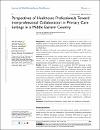Perspectives of healthcare professionals toward interprofessional collaboration in primary care settings in a middle eastern country

التاريخ
2021المؤلف
El-Awaisi, A.Awaisu, A.
Aboelbaha, S.
Abedini, Z.
Johnson, J.
Al-Abdulla, S.A.
...show more authors ...show less authors
البيانات الوصفية
عرض كامل للتسجيلةالملخص
Background: Primary healthcare (PHC) setting is regarded as a central pillar to the healthcare system as it tends to be the first point of contact for patients. Interprofessional collaboration between healthcare professionals (HCP) in PHC settings remains unexplored in the Middle East. Aim: The objective of this study was to explore the perspectives of HCP in PHC centers towards interprofessional collaboration and to identify the facilitators and the barriers to collaborative practice. Methods: A cross-sectional, web-and paper-based survey involving HCP in PHC centers was conducted in Qatar. Descriptive statistics as well as Student's t-test and One Way ANOVA test were performed to determine statistical differences in Readiness for Interprofessional Learning (RIPLs) scores between demographic groups. Results: Overall, 1415 participants out of a potential 2500 HCP practicing in Qatar completed the survey (response rate, 56.6%). HCP generally indicated a positive attitude and readiness towards interprofessional collaboration. Furthermore, physicians had slightly more positive readiness towards understanding their professional identity than other health-care professionals. Participants with previous interprofessional collaboration or interprofessional education experiences exhibited greater, but non-significant positive attitudes toward interprofessional collaboration compared to those without previous experiences. Identified barriers and facilitators included are conceptual rather than structural. Facilitating factors included HCP readiness and perceived benefit of interprofessional collaboration effectiveness in the work setting, increased professional satisfaction, respect between healthcare professions, appreciation of others' contribution, leadership, and institutional support. Top perceived barriers included leadership and support, time commitment, and resources constraints. Conclusion: HCP in PHC settings have demonstrated the willingness and readiness to engage in interprofessional collaboration. Recent reforms within the PHC setting consist of promoting interprofessional teams and collaborative culture. However, it is imperative to provide training and education to foster and support interprofessional collaborative practices. 2021 El-Awaisi et al.
المجموعات
- أبحاث الصيدلة [1458 items ]


